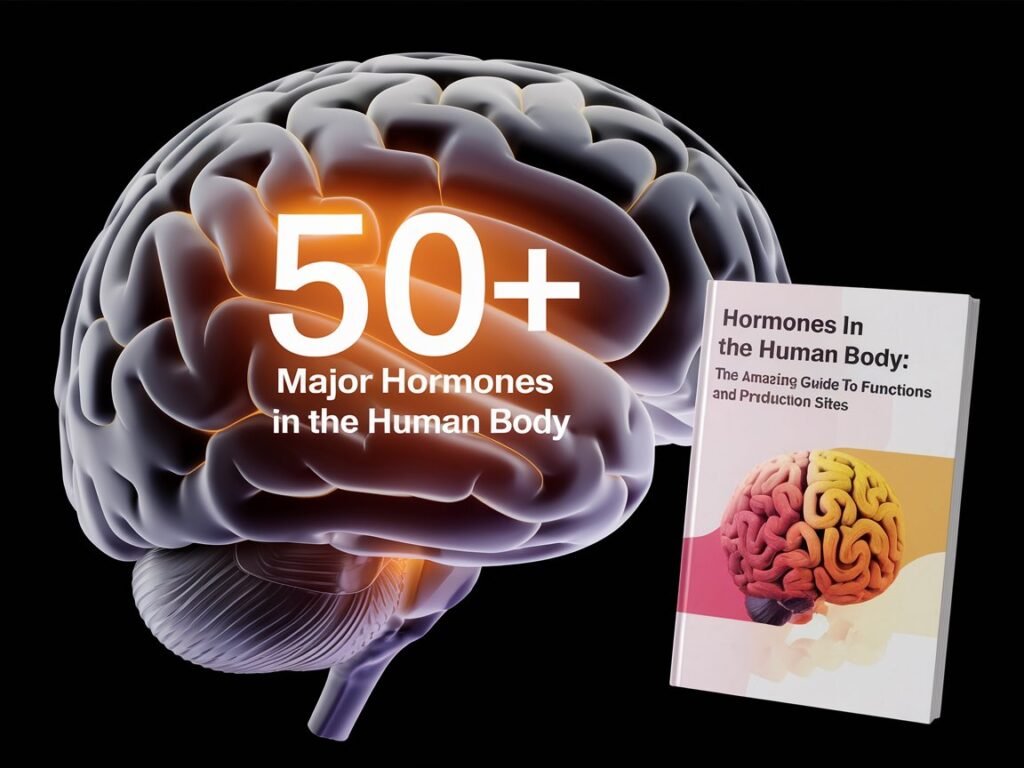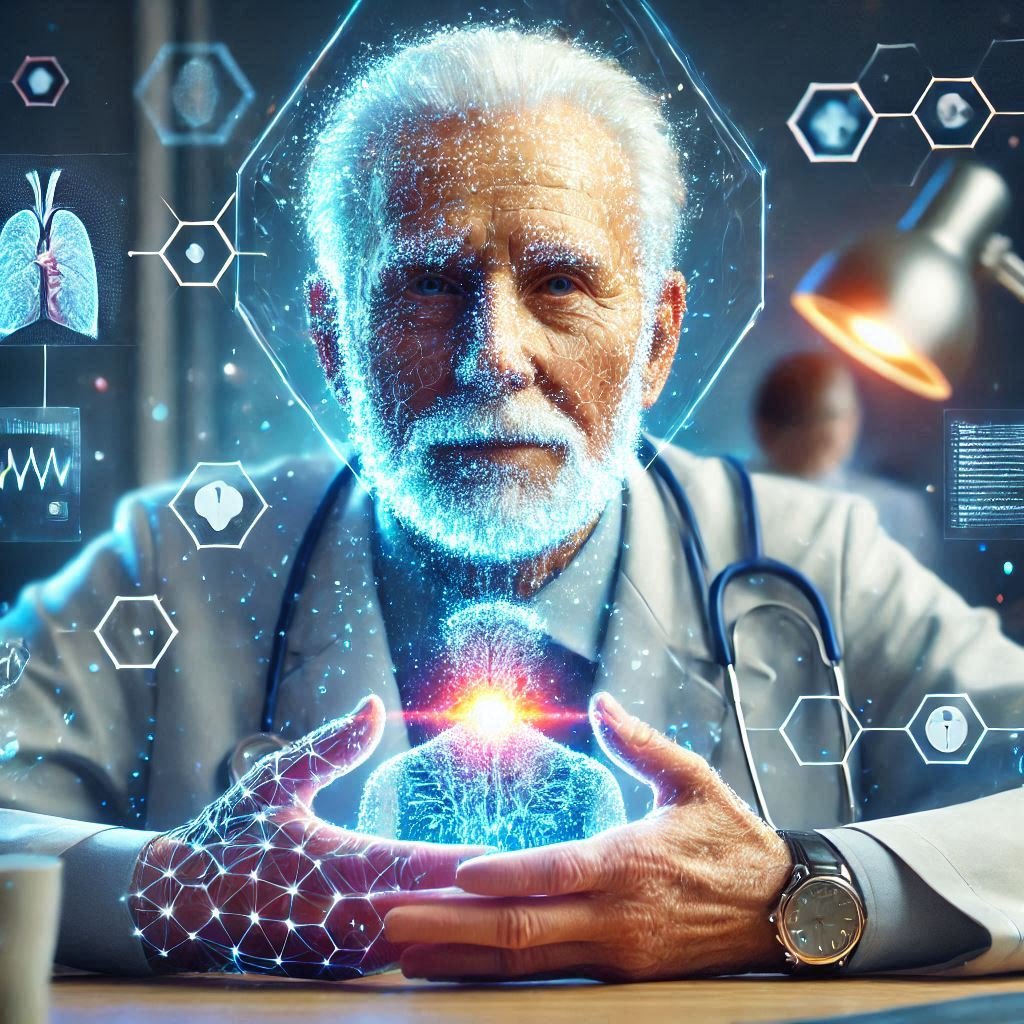Hormones in the human body are essential chemical messengers that regulate nearly every aspect of our health. From controlling metabolism and growth to managing stress and reproduction, these powerful molecules play a vital role in maintaining balance within the body. In this ultimate guide, we’ll explore the fascinating world of hormones in the human body, their functions, and where they are produced.
1. Hypothalamus Hormones (Regulate Pituitary Gland)
The hypothalamus, a small region in the brain, produces hormones that control the pituitary gland, which in turn regulates other glands.
-
Thyrotropin-releasing hormone (TRH) – Stimulates the release of TSH (Thyroid-stimulating hormone) from the pituitary.
-
Corticotropin-releasing hormone (CRH) – Stimulates ACTH (Adrenocorticotropic hormone) release, triggering cortisol production.
-
Gonadotropin-releasing hormone (GnRH) – Stimulates FSH (Follicle-stimulating hormone) and LH (Luteinizing hormone) for reproductive function.
-
Growth hormone-releasing hormone (GHRH) – Stimulates growth hormone (GH) production.
-
Somatostatin (Growth hormone-inhibiting hormone, GHIH) – Inhibits GH and TSH release.
-
Dopamine (Prolactin-inhibiting hormone, PIH) – Inhibits prolactin release, preventing milk production when not needed.
2. Pituitary Gland Hormones (Controls Many Other Hormones)
The pituitary gland, often called the “master gland,” produces hormones that regulate other glands and bodily functions.
Anterior Pituitary
-
Growth hormone (GH) – Promotes growth, muscle development, and fat metabolism.
-
Prolactin (PRL) – Stimulates breast milk production.
-
Adrenocorticotropic hormone (ACTH) – Stimulates cortisol release from the adrenal glands.
-
Thyroid-stimulating hormone (TSH) – Regulates thyroid function by stimulating T3 & T4 production.
-
Luteinizing hormone (LH) – Stimulates ovulation in females and testosterone production in males.
-
Follicle-stimulating hormone (FSH) – Stimulates egg and sperm production.
Posterior Pituitary
-
Oxytocin – Triggers labor contractions, milk ejection, and emotional bonding.
-
Vasopressin (Antidiuretic hormone, ADH) – Controls water balance by reducing urine output.
3. Thyroid Gland Hormones (Regulate Metabolism)
The thyroid gland produces hormones that regulate metabolism, energy, and growth.
-
Thyroxine (T4) – Increases metabolism, heart rate, and growth.
-
Triiodothyronine (T3) – More potent than T4; regulates energy production and metabolism.
-
Calcitonin – Lowers blood calcium by inhibiting bone breakdown.
4. Parathyroid Gland Hormone (Regulates Calcium Levels)
-
Parathyroid hormone (PTH) – Raises blood calcium by stimulating bone resorption and calcium absorption in the intestines.
5. Adrenal Gland Hormones (Regulate Stress, Metabolism, & Blood Pressure)
The adrenal glands produce hormones that help the body respond to stress and regulate metabolism.
Adrenal Cortex (Outer Layer)
Cortisol – Helps the body respond to stress by increasing blood sugar and suppressing the immune system.
Aldosterone – Regulates blood pressure by controlling sodium and water retention.
Androgens (DHEA, Androstenedione) – Precursors to testosterone and estrogen, involved in puberty and muscle growth.
Adrenal Medulla (Inner Layer)
Epinephrine (Adrenaline) – Increases heart rate and energy levels during stress (“fight-or-flight”).
- Norepinephrine (Noradrenaline) – Works with adrenaline to enhance alertness and blood pressure
6. Pancreatic Hormones (Regulate Blood Sugar & Digestion)
The pancreas produces hormones that regulate blood sugar levels and digestion.
-
Insulin – Lowers blood sugar by helping cells absorb glucose.
-
Glucagon – Raises blood sugar by breaking down glycogen stores.
-
Somatostatin – Inhibits insulin, glucagon, and GH release.
-
Pancreatic Polypeptide (PP) – Regulates pancreatic secretion and appetite.
7. Reproductive Hormones (Regulate Sexual Function & Development)
Reproductive hormones are crucial for sexual development and function.
Ovarian Hormones (Females)
-
Estrogen (Estradiol, Estrone, Estriol) – Regulates the menstrual cycle, bone health, and secondary female characteristics.
-
Progesterone – Supports pregnancy and the menstrual cycle.
-
Inhibin – Inhibits FSH to regulate egg development.
Testicular Hormones (Males)
-
Testosterone – Promotes sperm production, muscle mass, and male characteristics.
-
Inhibin – Inhibits FSH to regulate sperm production.
8. Pineal Gland Hormone (Regulates Sleep)
-
Melatonin – Controls sleep cycles based on light exposure.
9. Kidney Hormones (Regulate Blood & Bone Health)
The kidneys produce hormones that regulate blood pressure and bone health.
-
Erythropoietin (EPO) – Stimulates red blood cell production.
-
Renin – Helps regulate blood pressure by activating the renin-angiotensin system.
-
Calcitriol (Active Vitamin D3) – Enhances calcium absorption in the intestines.
10. Heart Hormone (Regulates Blood Pressure & Flui
Atrial natriuretic peptide (ANP) – Lowers blood pressure by promoting sodium excretion.
11. Gastrointestinal Hormones (Aid Digestion & Appetite Regulation)
The digestive system produces hormones that regulate appetite and digestion.
-
Gastrin – Stimulates stomach acid production.
-
Cholecystokinin (CCK) – Stimulates bile and digestive enzyme release.
-
Secretin – Stimulates the pancreas to release bicarbonate, regulating stomach acidity.
-
Ghrelin – Increases hunger and stimulates GH release.
-
Leptin – Suppresses appetite and regulates fat storage.
-
Motilin – Regulates digestive tract movement.
12. Placental Hormones (Support Pregnancy)
The placenta produces hormones that support pregnancy and fetal development.
-
Human chorionic gonadotropin (hCG) – Maintains pregnancy and stimulates progesterone production.
-
Human placental lactogen (hPL) – Supports fetal growth and metabolism.
13. Adipose (Fat) Tissue Hormones (Regulate Metabolism & Inflammation)
Fat tissue produces hormones that regulate metabolism and inflammation.
-
Leptin – Signals fullness and regulates energy balance.
-
Adiponectin – Enhances insulin sensitivity and reduces inflammation.
-
Resistin – May contribute to insulin resistance.
14. Bone Hormone (Regulates Bone Growth)
-
Osteocalcin – Supports bone mineralization and insulin regulation.
15. Thymus Hormones (Regulate Immune Function)
The thymus gland produces hormones that play a role in immune system development.
-
Thymosin – Stimulates the development of T-cells, which are critical for immune function.
-
Thymopoietin – Supports T-cell maturation and immune system regulation.
16. Liver Hormones (Regulate Growth & Metabolism)
The liver produces hormones that influence growth and metabolism.
-
Insulin-like growth factor 1 (IGF-1) – Promotes growth and development, working closely with growth hormone (GH).
-
Hepcidin – Regulates iron levels in the body by controlling iron absorption and release.
17. Skin Hormones (Regulate Vitamin D Production)
-
Calcidiol (25-hydroxyvitamin D) – Produced in the skin when exposed to sunlight; converted to active vitamin D3 (calcitriol) in the kidneys.
18. Gastrointestinal Hormones (Additional Hormones)
-
Gastric inhibitory peptide (GIP) – Stimulates insulin release and inhibits stomach acid secretion.
-
Peptide YY (PYY) – Reduces appetite and slows digestion after eating.
19. Reproductive Hormones (Additional Hormones)
-
Anti-Müllerian hormone (AMH) – Regulates follicle development in females and plays a role in male fetal development.
-
Relaxin – Produced during pregnancy to relax pelvic ligaments and prepare the body for childbirth.
20. Adrenal Hormones (Additional Hormones)
-
Dehydroepiandrosterone sulfate (DHEA-S) – A precursor to sex hormones like testosterone and estrogen.
-
Corticosterone – Works with cortisol to regulate immune response and metabol
21. Brain Hormones (Neurotransmitters with Horm
-
Serotonin – Regulates mood, appetite, and sleep; also acts as a neurotransmitter.
-
Dopamine – Besides inhibiting prolactin, it regulates reward, motivation, and movement.
22. Other Hormones and Growth Factors
-
Erythropoietin (EPO) – Already mentioned, but worth reiterating its role in red blood cell production.
-
Natriuretic peptides (BNP) – Works alongside ANP to regulate blood pressure and fluid balance.
-
Endothelin – Regulates blood vessel constriction and blood pressure.
-
Adrenomedullin – Helps regulate blood pressure and fluid balance.
-
Prolactin-releasing peptide (PrRP) – Stimulates prolactin release in specific conditions.
Frequently Asked Questions (FAQs)
A: Some of the most important hormones include insulin (regulates blood sugar), cortisol (manages stress), thyroid hormones (control metabolism), and sex hormones like estrogen and testosterone (regulate reproduction).
A: Hormones act as messengers, traveling through the bloodstream to target organs or tissues. They bind to specific receptors to trigger responses, such as increasing heart rate, stimulating growth, or regulating appetite.
A: Hormonal imbalances can lead to a range of health issues, including weight gain, fatigue, mood swings, and reproductive problems. Conditions like diabetes, hypothyroidism, and polycystic ovary syndrome (PCOS) are often linked to hormonal imbalances.
Final Thoughts
Hormones are essential for maintaining balance in the body. From regulating metabolism and growth to controlling reproduction and stress responses, these chemical messengers play a vital role in our overall health. Understanding how hormones work can help you appreciate the complexity of the human body and the importance of keeping your endocrine system healthy.
By learning about these 50+ hormones, you’ve taken a step toward understanding the intricate systems that keep your body functioning. Whether you’re looking to improve your health or simply satisfy your curiosity, this guide provides a solid foundation for exploring the fascinating world of hormones.
Few more interesting must read content below
-
Neuroplasticity: 5 Steps to Rewire Your Brain for Success
-
Which Utensil is Healthiest for Eating? Complete Guide to 9 Utensils and Their Health Effects
-
18 Laws of Human Nature: Ultimate Guide to Decode People Like a Pro
-
His Holiness Beloved SP Maestro MahaaGURU Ji Invited as Special Guest for Hanuman Chalisa Meditation in London
-
1600+ Days of Continuous Yagnas and Counting: An Ongoing Mission for Global Harmony
-
Journey of His Holiness Beloved SP Maestro MahaaGURU Ji
-
Free Medical Camp Serves 150 Residents in Ramalakshmana Pally
-
What Are Mudras? 7 Sacred Hand Positions That Powerfully Transform Your Well-Being
-
7 Rules for Charisma: Proven Secrets to Become Magnetic in Any Room
-
Healing the Inner Child: 4 Powerful Trauma Types & Affirmations to Transform Your Life
Also visit our below websites
A spiritual website filled with inspiring content to help you deepen your understanding of mindfulness and living in the present. Explore their teachings to enrich your journey toward inner peace.
A platform dedicated to motivating and uplifting the spirit of youth. If you’re looking for ways to inspire younger generations to embrace the present, this is a fantastic resource.
A spiritual website with inspiring content centered around the idea of “Universal Oneness.” Their teachings align beautifully with the art of being present and finding happiness in every moment.



